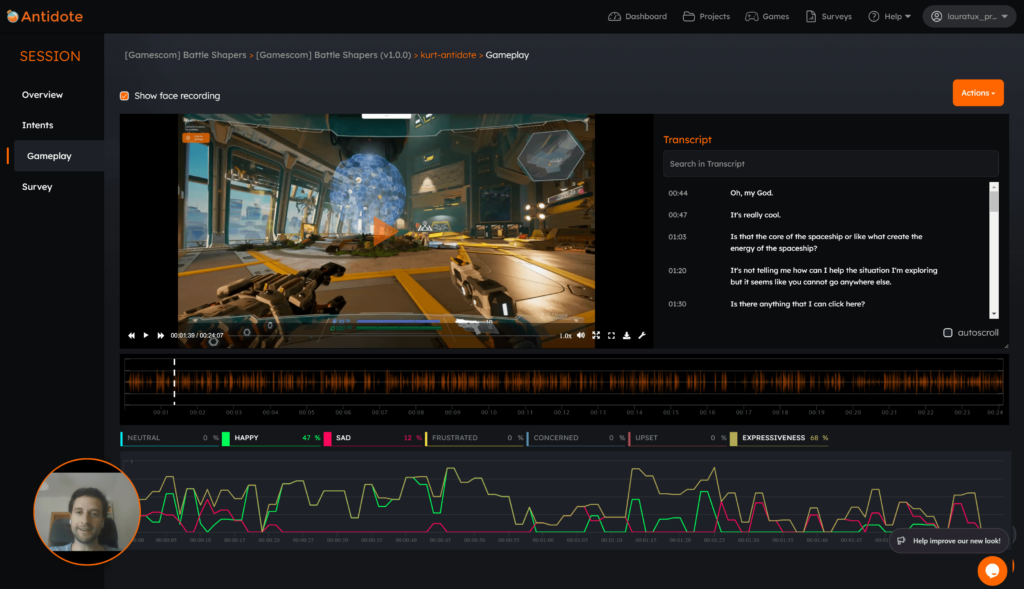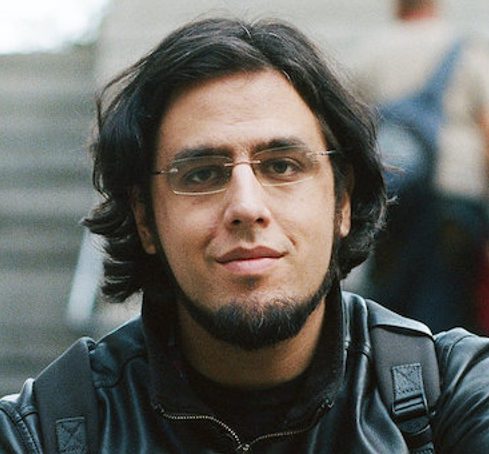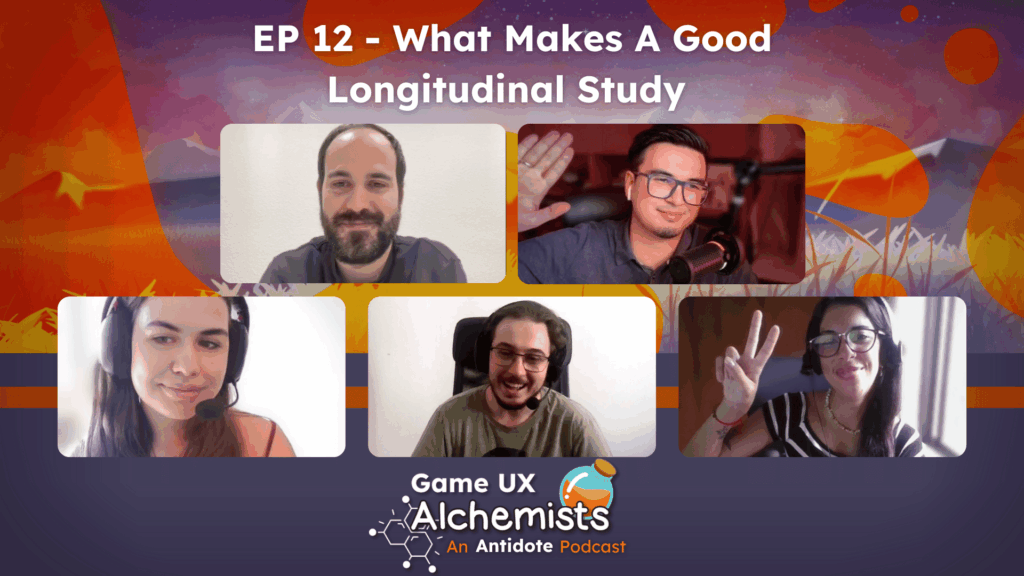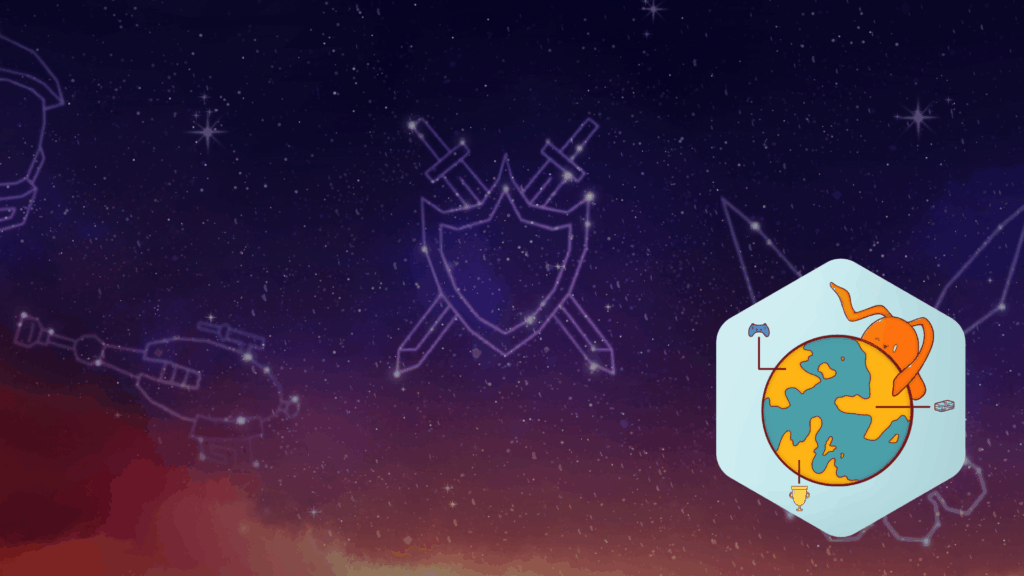After the initial hype wave of NFTs and Blockchain technology being adopted on video games, we’ve seen a decline in interest and sales volume which opens a window of rationality to analyse what has happened so far and build the next generation of games based on experience enhancement potential instead of jumping on the trend for the sake of exposure.
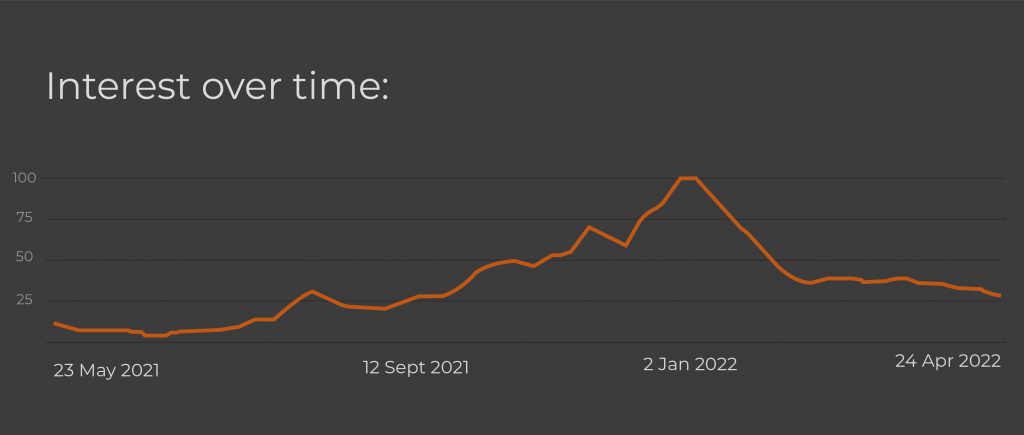
NFT interest over the past 12 months Worldwide via Google Trends.
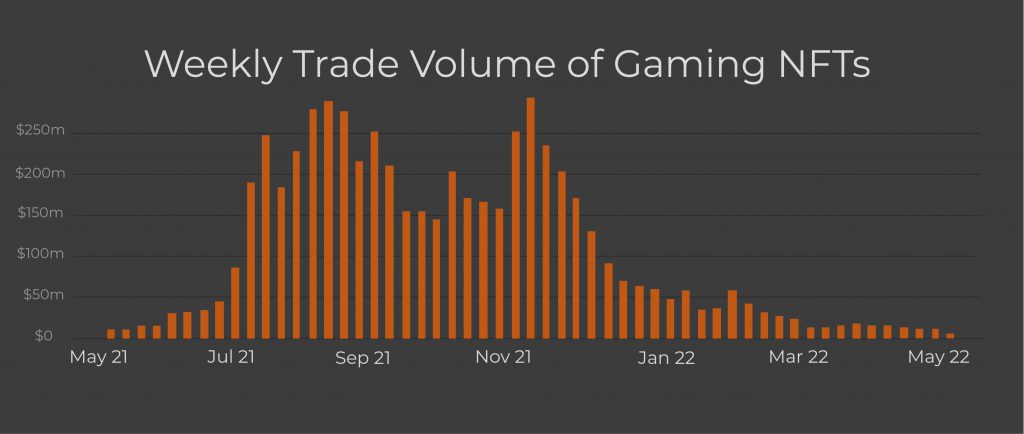
Weekly Trade Volume of Gaming NFTs over the past 12 months via TheBlockCrypto.
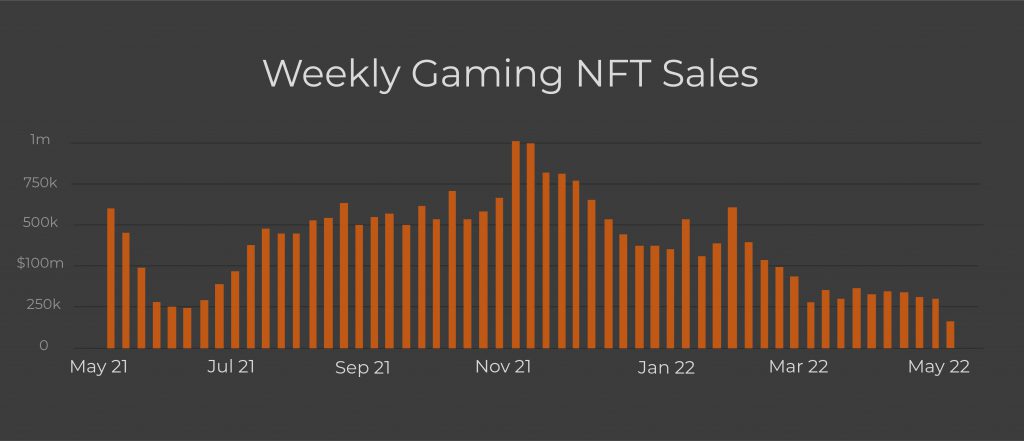
Weekly Gaming NFT Sales over the past 12 months via TheBlockCrypto.
Publishers and Developers Point of View: Gamesbeat 2022
During the GamesBeat Summit 2022 we got the opportunity to sit in various talks by professionals in the gaming industry who shared their insights on multiple topics such as the future of mobile gaming, what the metaverse will look like, and the one we will be unfolding on this blog post:
The inclusion of Blockchain and NFTs in gaming.
This topic that seems to be all over social media, was first propelled by early innovative creators paving the way (e.g The Sandbox, Decentraland, Axie Infinity, My Neighbour Alice, etc) and causing the debate to progress beyond the internet and making its way into business meetings and brainstorm sessions of major gaming companies like Square Enix.
So now, it’s not only a thread on Twitter or a Reddit post, it is a real possibility that various professionals are looking into. The discussion seems to have shifted from will it happen to HOW will it happen.
Here are the collected highlights and different positions regarding the topic:
Some claim that the resistance for NFTs looks a lot like the one there used to be around Free to Play games, and that it is mostly Western, meaning that it typically comes from the U.S. and some European places.
This was first pointed out by Yat Siu, Co-founder & Chairman of the Board
Animoca Brands during the “How Blockchain Games will go mainstream” talk. Animoca Brands is a Hong Kong-based game software company that has a large portfolio of blockchain games, as well as traditional games.
The point he makes about Free to Play games definitely stood out for us, he claims that there’s a possibility that history might be repeating itself.
However, our survey’s results show that the concern for the inclusion of blockchain games is still very much present for gamers, making various developers back down from them.
During this talk, Yat Siu stated that blockchain games will go mainstream eventually, and players will finally accept it once they understand and see what it is all about.
He also dedicates some time to assuring the public claiming that there’s a mutual agreement that the elevated prizes we see when we talk about NFTs won’t come to the gaming world, a place that is not motivated by money and where we are all in the same conditions.
And this seems to be one, if not the biggest concern players have right now. A lot of people find games to be a way of escaping the sometimes unfair and mostly tiring system we live in. If there is a way that this could be brought to what most people see as a safe space, then it loses its purpose and it is no longer safe nor fair.
But from saying it to actually taking action and doing it, there’s still some work to do.
On the other hand, we attended “The NFT debate” held by David Kim, who is the head of Publishing at WAX Studios and Rami Ismail, a dutch independent video game developer.
Rami Ismail insisted that they still don’t see any use for blockchain that will result in groundbreaking or useful gaming mechanics, but they could see it happen in the future.
Moreover, others remark on the satisfaction that comes from NFT ownership with the sentimental value attached to it.
One thing that seemed to be a common opinion around all of the talks we were able to attend was that there is a common agreement that there are a lot of ways to implement the aspect of ownership and combine it with fun, and that will be the real challenge, to make games that people will want to take part in.
And this is a point that really stood out for us, because at Antidote, our aim is to help companies create the top, most amazing and fulfilling experiences for all of us, players.
And we do it by helping gaming studios and developers implement game user research and testing methodologies in their development processes where players take ownership of the most important part.
At the end of the day, the ultimate goal is to bring the best we can to the gaming community.
And what better way to start than by asking the players what THEY know, think and want…
Gamers’ Point of View
We asked our community of players from different parts of the world some questions regarding the topic of Blockchain, NFTs, their inclusion in gaming, and the P2E (play to earn) format. Not only did we get some interesting sentiment data from it, but they also left interesting suggestions that we think could be the base for great game concepts.
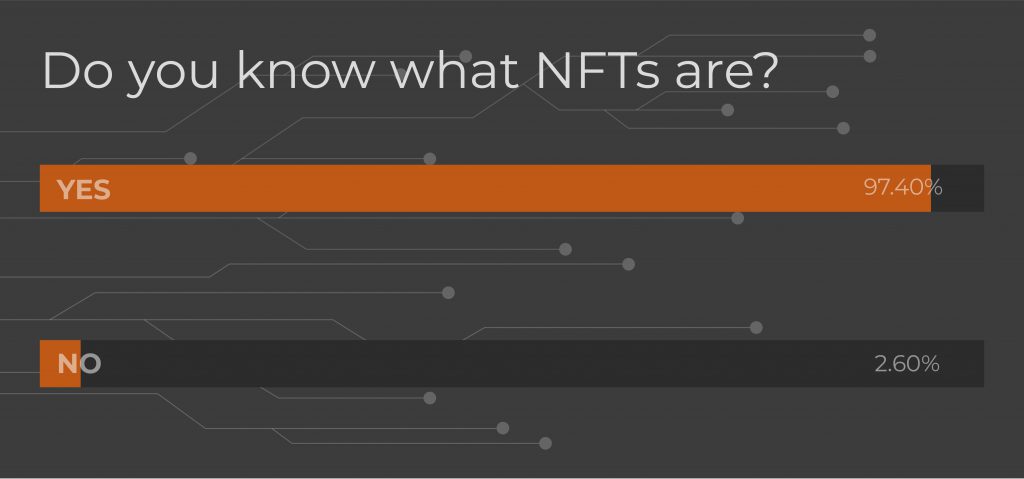
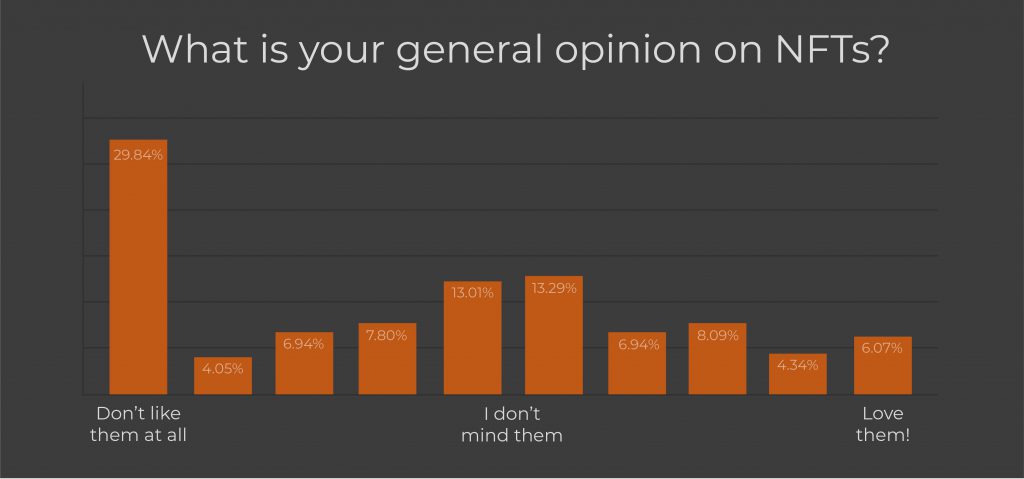
When it comes to general knowledge about NFTs, the majority of our players seemed to be in the loop, with a result of 97.40% of them claiming to know what an NFT was, however, when asked what their opinion was of them, around 40% leaned towards a negative sentiment.
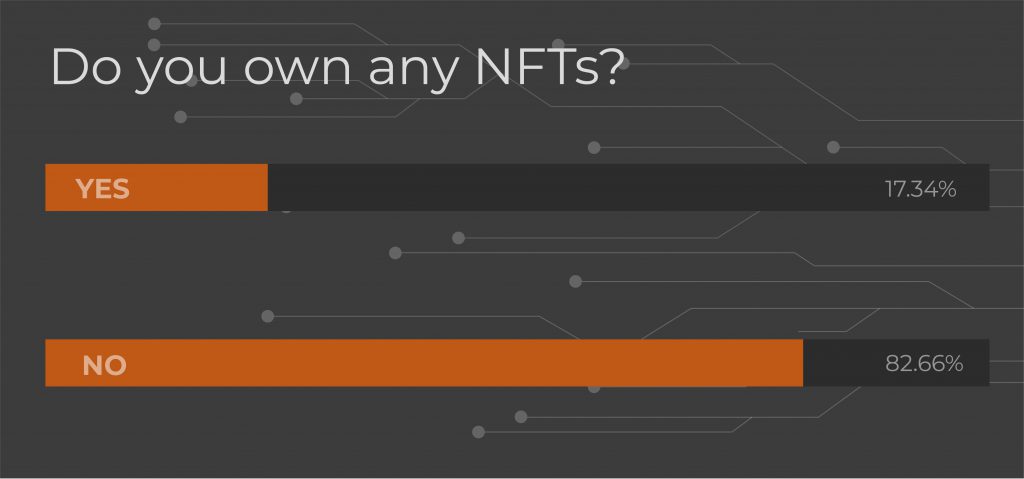
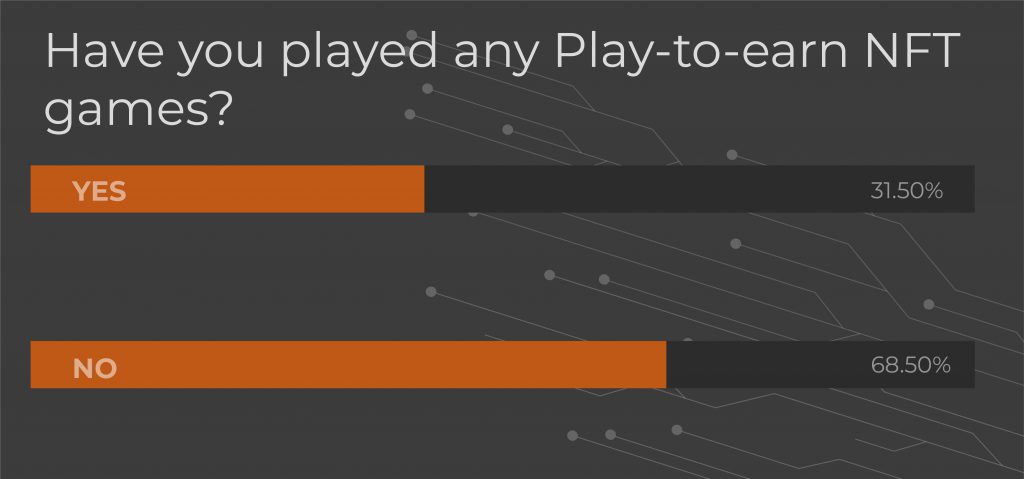
When asked if they owned any NFTs however, the gap was shorter this time, with less than 20% being owners of an NFT.
Regarding the P2E model, over 68.5% of them never got a chance to play these games.
It is also worth mentioning that, the ones that DID play this game model answered that the onboarding experience wasn’t very challenging, but it wasn’t the easiest either, 31.50% stated that there was definitely a learning curve, but eventually, they got the hang of it.
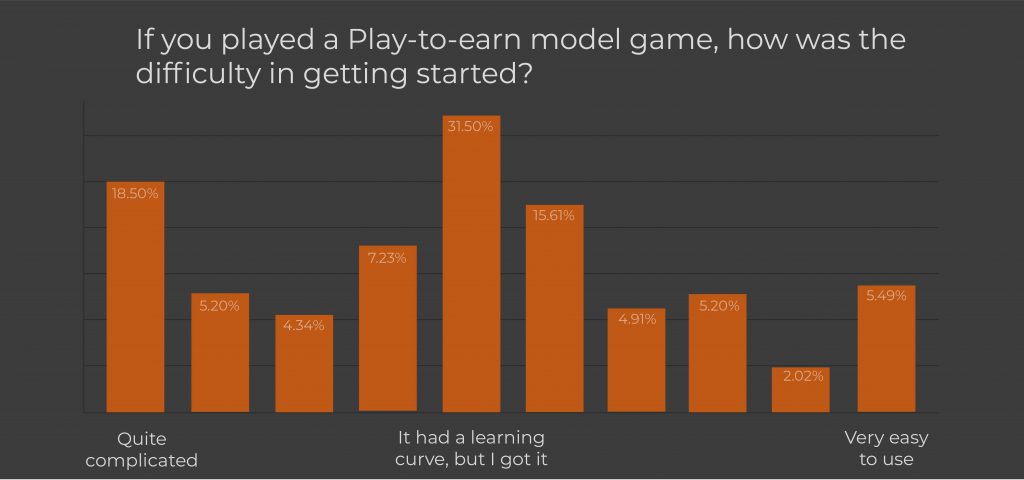
The following graphic shows the level of concern players have towards game developers using this game model to prioritise economic gain instead of focusing on creating memorable gaming experiences.
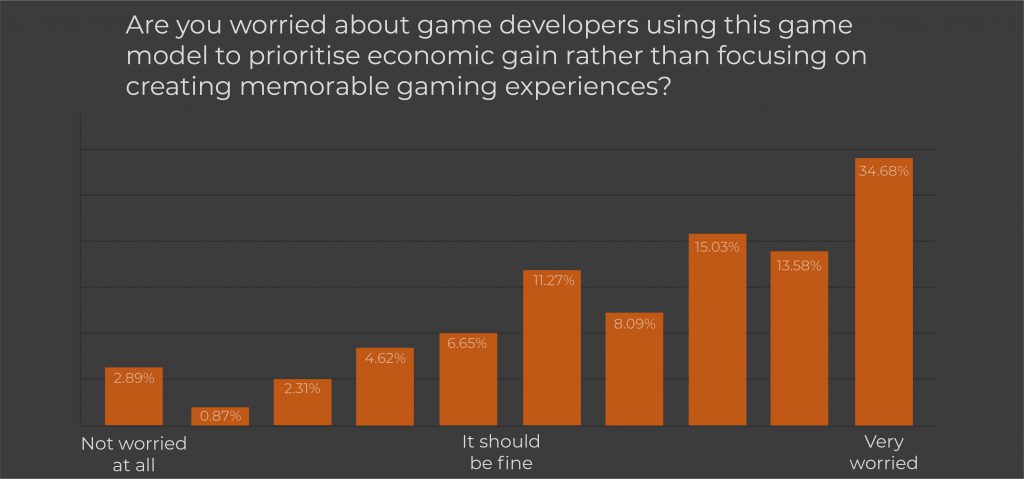
As we can see, although the technological advancements seem to only go forward, this fear is still very present in players’ minds, and it’s one we should listen to.
The concern that some developers may be investing in these gaming experiences just to join the movement is very real, and it should be addressed properly to ensure the best product for the public.
Also, regarding the current state of the crypto market, the fear will only grow bigger amongst different communities, and with reason, the recent crashes of different coins, for some people it “pulls a curtain” and shows the reality of this model.
No more shiny apes, this is a serious topic that should be handled carefully.
It shows that we may not be ready for the complete inclusion of cryptocurrency in every aspect of our lives, and the acceptance of this new model will be harder than ever.
How to Approach NFTs in Gaming: A Gamer’s Love Letter to Developers
And this is where they come in… Our last question on our survey was “In your opinion, what would be the ideal NFT implementation that games should have in order to be a good gaming experience?”.
We found some great insights that came directly from the players:
- The majority of the answers are all centered on one topic: equality. Most players say that if NFTs were implemented, they should be earned by grinding on the game itself and not having to pay for them. Also, try and make sure that holding said NFT does not provide an unfair advantage to players.
- Another answer that seemed to be common amongst the community was surrounding game mechanics. Most people wish that the inclusion of NFTs doesn’t change the game or the way it’s played, the ideal implementation would be by adding cosmetics (skins, badges, accessories) that way the heart of the game wouldn’t change. This will also make it free will, whoever wants to get an NFT can do it, but the ones that don’t wish to do so, can still play the same game they bought.
- Some of them suggested for NFTs to be bought with IN GAME currency that you will eventually win by playing the game, and trading can be up to the players to decide if they want to do it or not.
- A response that stood out for us was the longevity of the value of said NFTs, some players said that they think an interesting addition would be objects that can be used in multiple versions of the same title and that will still be useful in future games. A good example of this would be FIFA’s football player cards or weapons on CSGO.
- Another suggestion that came up was that if NFTs had to be added it would be cool to have exclusive content outside of the game, like some behind the scenes look, tickets to events where the developers would attend, etc which goes hand in hand with what lots of NFT projects offer as their smart contract features.
- Some of them also pointed out one of the biggest concerns surrounding NFTs in general, and that the developers should focus on the ones that are environmentally friendly. Companies like The Sandbox already took action to mitigate the potential impact that certain blockchains can have by migrating to other more efficient scaling solutions.
- Also there’s an interest in including the community in the process and making it easier for them not only to learn how to use them but to create their own!
The Players: The Variable That Truly Matters
In this ever-changing world, transparency is key. As stated before, it is not a matter of whether will it happen but how will it happen. Nowadays the crypto market is unstable, and NFT sales dropped more than 90%, so uncertainty is at an all-time high.
However, we cannot deny that technology will still advance and that this topic of conversation is everywhere we look. Right now changes in the gaming industry seem to be imminent, but how can we prepare for them?
We think the best option is listening to the ones that know this world the best: the gaming community. If publishers and developers listen to their input, feedback and complaints, they can create the best option for them and consequently for the company itself.
If there’s one thing we should take away from the current state of things right now, is that nothing is set in stone, there’s still a lot of work to be done to actually get to this hypothetical reality.
Thus, conducting game user research from concept phase to launch and beyond should definitely play a big role in this uncharted territory.
